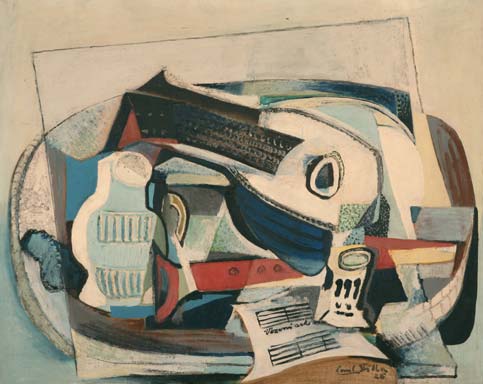Description
The work "Modré Záti í" (1926) by Emil Filla is a vibrant testimony of the talent of the Czech artist, recognized as one of the most prominent figures of Cubism in his country. Filla, whose career covered various stages and styles, achieved in this composition a synthesis between the tradition of dead natures and the formal innovations of the cubist movement. The work is characterized by a careful disposition of the elements, which combines geometric shapes with a deliberate use of color, specifically blue, which gives name to paint.
When observing "Modré Záti í", we are facing a composition in which the blue color predominates, creating an atmosphere of serenity and depth. This use of blue is not just decorative; On the other hand, it acts as a means to form the structure of the painting, in which each object becomes a more complex component. The choice of color suggests not only emotions, but also refers to the influence of the environment and Czech culture, marked by a deep affection towards nature and the symbolism it offers. The shapes of the objects, which include bottles and containers, are stripped of their realistic representation, achieving an abstract approach that invites the viewer to interpret the paint from multiple angles.
As for the composition, Filla organizes the space so that each element, although abstract, maintains a dynamic relationship with others. This provision confers to painting A sense of internal movement, almost vital, where lines and shapes seem to dialogue with each other. This is a distinctive feature of the cubist approach, where the artist displays a multifaceted vision of the object, looking for the viewer not only to observe, but also actively participate in the creation of meaning from the work.
The absence of human figures can be interpreted as a resource that allows attention to fall completely on inanimate objects, raising them to an almost symbolic level of importance. In this sense, "Modré Záti í" becomes a visual exercise that transcends the conventional representation of the still life, establishing a dialogue between the elements represented and the spectator's perception.
Filla is in dialogue with other artistic traditions of his time, such as Fauvism and constructivism, which enriches his work. Although their contemporaries explored the purity of color and shape, Filla enters a more introspective style that invites contemplation. The modernity of "Modré Záti í" lies in this synthesis, in which the color does not simply adorns, but defines the structure of the work.
Through "Modré Záti í", Emil Filla not only leaves a relevant artistic legacy, but also challenges traditional notions about what a still life, promoting a perception that connects with the complexity of human experience. In a world where the aesthetics of everyday life can be relegated to oblivion, Shark invites to rediscover that intrinsic beauty, through a work that, beyond its superficial simplicity, encloses a universe full of nuances and meanings.
KUADROS ©, a famous paint on your wall.
Hand-made oil painting reproductions, with the quality of professional artists and the distinctive seal of KUADROS ©.
Art reproduction service with satisfaction guarantee. If you are not completely satisfied with the replica of your painting, we refund your money 100%.

